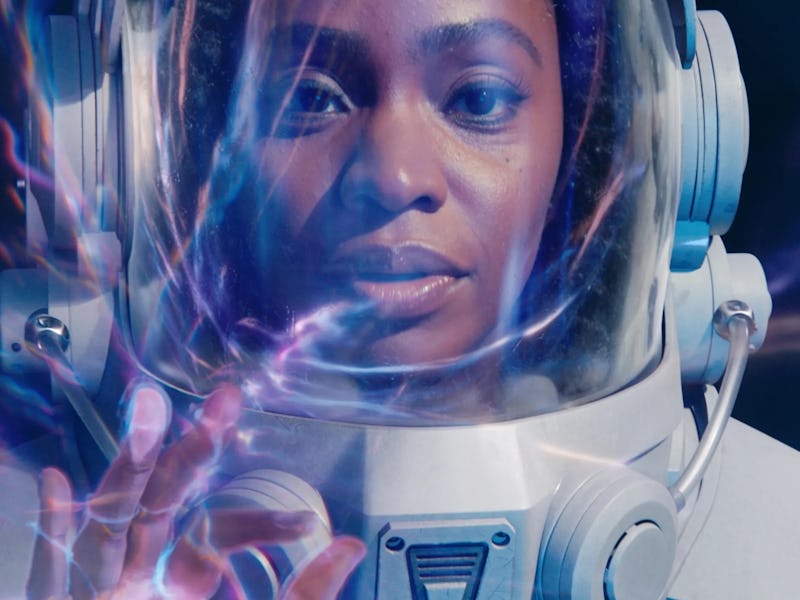The Marvels is Good, Actually
Three months after its disappointing debut, the MCU’s biggest bust gets a second life on Disney+.

It’s no secret The Marvels got a bad rap. The latest entry in Marvel’s Cinematic Universe was met with skepticism at every turn. Like its predecessor, Captain Marvel — or any of the franchise’s more inclusive fare — The Marvels struggled against a tedious “anti-woke” backlash. Coupled with a slew of bad faith exposés about behind-the-scenes delays and perfunctory test screenings, the film seemed doomed for failure before it even premiered. The Marvels concluded its theatrical run as the lowest-grossing MCU project, and one of the worst received by critics... but it’s hard to gauge its true quality when it never got a chance to prove itself.
The Marvels works hard to rise above the failings of its franchise. The MCU was struggling long before director Nia DaCosta was tapped to helm the Captain Marvel sequel, and she does the very best with what she’s given. Her efforts, and the efforts of a game creative team, produced a film much more fun than anyone really gave it credit for. Upon its release, its flaws were the main topic of conversation, at least among those who actually gave it a chance.
Given Marvel’s recent track record, no one can really be blamed for feeling wary about The Marvels. But now that it’s finally found a home on Disney’s streaming platform, it’s much easier to appreciate its strengths rather than dwell on its weaknesses. A second life on Disney+, free of the critical and box office pressure it faced last year, makes it just another movie that can be appreciated without care for internet discourse.
The Marvels came at a weird moment in MCU history. The four years since Carol Danvers (Brie Larson) became Captain Marvel in her 2019 origin story have been much longer within the Marvel Universe itself. There, it’s been decades since Carol first took on the mantle, and much has changed: relations between the Skrull and the Kree have soured further, with Nick Fury (Samuel L. Jackson), fresh off a humanitarian crisis in Secret Invasion, caught in the middle. Carol’s wartime wingwoman, Maria Rambeau (Lashana Lynch), was lost to cancer, leaving her daughter Monica (Teyonah Parris) unmoored.
Meanwhile, Carol’s crusade against the Kree has turned the planet Hala into a dying husk. The destruction of the Supreme Intelligence, the AI superbeing that once governed the Kree, has seen a vengeful warrior (Zawe Ashton) take power, and she’s targeting every world Carol ever called home to avenge Hala’s suffering. It’s a fairly serious brief for an otherwise breezy and bizarre film. The Marvels clocks in at 100 minutes, and Carol’s quest is filled with detours, physical gags, and even a musical number.
The film’s greatest strength comes in the form of its silliest gimmick. A fateful run-in with a space anomaly sees Carol “entangled” with Monica and her own self-titled superfan, Kamala Khan (Iman Vellani). As Ms. Marvel, she’s become a superhero in her own right, with powers she inherited from an extraterrestrial heirloom. This unlikely trio finds themselves switching places at the least opportune moments. They’re forced to work as a team to defeat Ashton’s Dar-Benn: hijinks ensue, of course, but The Marvels also takes great care to find the heart beneath all the mischief.
The Marvels can’t fully rise above the trademark MCU mess, but it’s still a charming film.
Even with the help of a unique premise and brisk, kinetic action, The Marvels is not without its flaws. It bears the telltale signs of behind-the-scenes tumult: the film was clearly recut and reshot within an inch of its life, resulting in a story that often fails to let any big moments sink in. It leans hard on the charm of its core cast, and Larson, Parris, and Vellani certainly carry the film through its ups and downs. It’s not perfect, but it deserves the right to exist on its own terms. At the very least, it’s a fun detour from the muddled, weighty conflicts Marvel’s recently put out, and for fans tuning in via Disney+, that’s more than enough to justify its existence.
The Marvels is streaming on Disney+.
This article was originally published on